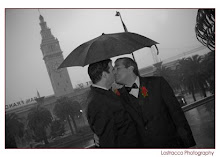California Supreme Court Tackles Gay Marriage - A Reason to Hope?
So we watched the 3 hour and 40 minute California Supreme Court hearing (watch it here - link's on the left side) on gay marriage today, and ended up being wowed by most of the Justices and the intelligence and shrewdness they displayed, especially when questioning the opposition.
The hearing started with testimony from three attorneys for the plaintiffs - and the questions asked ranged from why the earlier ruling ending the ban on interracial marriage applied here, if the court should overlook the "will of the voters" expressed in Proposition 22, which prevents the state from recognizing same sex marriages performed elsewhere, and what standard the plaontiffs thought the judges had to meet to overturn the ban on same sex marriage in California.
We were concerned, watching, that the other side would get the kid glove treatment, but the first witness for the opponents, Deputy Attorney General Christopher Krueger, was brought up short when he started his opening comments, only to be interrupted by Justice Joyce Kennard, who pushed him to answer why, in contrast to the plaintiffs, who all seemed to be on the same page with their arguments, the opponents were divided on their rationale. She mentioned the fact that the "private party" plaintiffs, a reference mainly to the religious groups opposed to gay marriage who have filed friend of the court briefs, mention procreation as one of the purposes of marriage... this was followed up later with pointed questions from several Justices asking if calling procreation one of the central purposes for "protecting marriage" also meant that infertile heterosexual couples should be banned from being married.
She also asked why the Governor, who would normally be represented by the Attorney General's office before the court, had retained separate counsel for this case, and if either issue meant the opponents had a weaker case. Krueger papered over the differences.
One of the Justices also responded to the opponents' assertion that the court should not be setting policy by asking if that meant the court had been wrong when they issued the order ending the ban on mixed race marriage.
All of the opponents also tried to assert that the ban on interracial marriage was different than the ban on gay marriage, because a) that still involved a man and a woman, and b) gay couples don't face animus from society. Huh? The Justices made short work of that one.
Glen Lavy, an opposition attorney, even trotted out this chestnut: marriage is by definition an opposite-sex relationship, and argued that therefore, the law doesn't stop gays and lesbians from marrying - just from marrying someone of the same sex. Isn't that great? You gays can get married - guys, just find yourself a nice girl to settle down with, and women, stand by your man.
The court also accepted last week's report from the New Jersey state legislature on how civil unions in that state have resulted in second class citizenship for gay and lesbian couples, an encouraging sign that hopefully indicates that the Justices are taking a close look at the Domestic Partnership laws to see how close they come to providing the same benefits as marriage.
We were pleased to see the Justices appear so well informed, and to take the time and make the effort to tear apart the weak defenses the opponents came up with to support their bigotry.
One judge on the court was clearly not on our side. Justice Ming Chin's questions seemed to have one purpose only - not to learn about the issue, but to find reasons to kick the can down the road. His stance seemed to be "you guys already have domestic partnership - just leave it alone."
For some reason, the opponents did not ask for a rebuttal time, and the plaintiffs used the time well.
We're cautiously hopeful that the court will come down on our side. But the timing of the ruling could be important, too.
There are two initiatives being circulated for signatures to qualify for the November ballot. One of these would simply ban gay marriage via the state constitution, which would overturn a favorable court ruling. The other would also roll back the domestic partner benefits the state has already provided, the same benefits several of the opponents relied on in their arguments today that California already gives gay and lesbian couples most of the rights and responsibilities of marriage.
Signatures to qualify either initiative for the Fall ballot must be turned in by April 1st.
The court has 90 days to rule on the case. If the ruling comes sooner rather than later, it could give the opposition more ammunition to get these hateful measures on the ballot - after all, "gay marriage is legal" is a lot scarier for the far right than "gay marriage might someday become legal".
So sit down and strap on those seatbelts - it's gonna be a bumpy ride.
--Scott




0 Comments:
Post a Comment
Subscribe to Post Comments [Atom]
<< Home